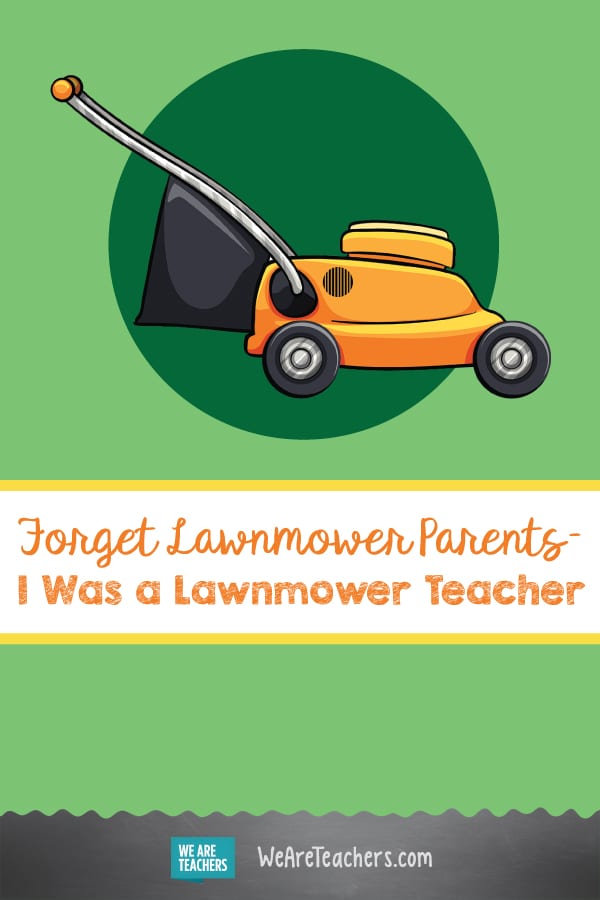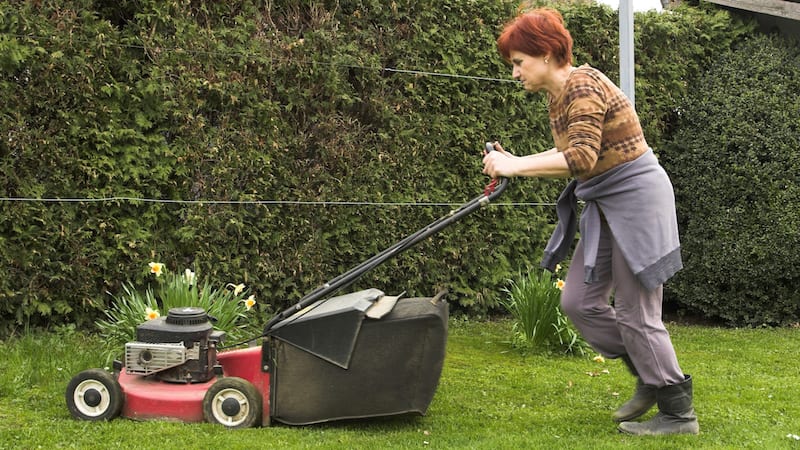Have you read this viral piece on lawnmower parents? When I read it, I saw my parenting life flash before my eyes: the school calls, the “emergency” supplies purchased, and the homework help. The piece gave me an odd sense of release that I could finally confess my secret sins, but I still had a dirtier secret. As a first and second grade teacher for years, I had been a lawnmower teacher as well.
What is a lawnmower teacher?
The definition of lawnmower parent is “one who goes to whatever lengths necessary to prevent their child from having to face adversity, struggle, or failure.” And it’s pretty much the same for a lawnmower teacher. The kids I teach are my children, and I did A LOT to help them along.
Here’s an example: one of my first graders had trouble with everything from opening his pencil case, to putting on his jacket. In the classroom, I could help him when I saw his struggle. But, I worried about how he’d do during lunch opening applesauce cups or getting ready for recess. So, I spent the beginning and end of every lunch period making sure he was okay. I stood in the cafeteria doorway or pretended I needed a napkin or fork and “happened” to walk by just as something needed opening.
Crazy, right?
Here’s one more example. This one’s a doozy. Benchmark reading assessments always struck me as kind of mean. I mean here’s a kid who’s working her patootie off to learn to read. She’s practicing every single day. She’s taking risks that I know are hard for her, and we come along and say, “Here, read this, and if you can’t, you aren’t at this “level” yet. Sorry!” So, I gave kids the benchmark books and told them to practice them and let me know when they were ready. Teachers everywhere are shaking their heads in disbelief. Principals are wondering how I lived amongst them without being noticed. I didn’t want them to have to fight so hard. I wanted them to feel good about themselves.
The anonymous writer of the lawnmower parent piece wrote, “I think that most lawnmower parents come from a good place. Maybe they experienced a lot of shame around failure as a child. Or maybe they felt abandoned by their parents in their moments of struggle, or dealt with more obstacles than most.”
I think I can say I agree. That said, so many teachers I know aren’t feeling very optimistic about the state of education. Maybe you haven’t gone as far as I did for my first and second graders, but I’ve bet you’ve been a “lawnmower teacher” once or twice before. Please tell me I’m right.
How to make a shift, in the interest of the students
In my later years of teaching, I confessed my lawnmower ways to my teaching partner. Cindy was one of those old school teachers who adored kids beyond compare. Watching her care and love brought tears to my eyes. When I confessed, she told me she totally got it, but that there was a different way. She told me kids really do need to feel failures and learn to cope with them. So together we developed a five pronged plan:
- Notice the difficulties students have without judgement.
- Develop a strategy to help them resolve the difficulty.
- Explicitly teach the strategy.
- Create a system for monitoring use of the strategy.
- Congratulate the student when he or she uses the strategy effectively.
This approach helped me feel less desperate about every child’s situation because, quite frankly, I was exhausted from protecting 23 small people’s hearts, minds, and bodies. You think being a lawnmower parent is time consuming? Try lawnmower teaching sometime!
Weaning off of lawnmower teaching
I’m not going to lie, it wasn’t an easy wean. I could hardly stand it when my students went out of the classroom to work with others. My brain was occupied with how my babies were doing out in the world. If this sounds crazy to you, I get it. Looking back, I can see that I wasn’t making a plan for their future lives outside my classroom. Lives they would most definitely need to lead. Is this a good place to share that I once looped from first to second grade because I just could not let go of my worry? I also considered becoming a Waldorf teacher because I’d heard you get to stay with the same students from Kindergarten through eighth grade and then take a year long sabbatical! Imagine.
But there wasn’t a Waldorf school anyplace near me, so I worked hard to let go. I gathered my students together to talk about goal setting and how great it was going to be. I spearheaded a self-control behavior chart instead of the one my administrator had required we use. The chart stayed the same, but the students were in control of it. We took time to stop between lessons and assess ourselves at self-control during the previous lesson. I started to notice subtle changes. Then, one day a particularly challenging child came flying in the door after recess. “Mrs. Moran,” he said. “I stopped myself during recess and told a teacher instead of hitting that stupid kid who bugs me!” His pride far outweighed my protection of him. I got it.
I’m still likely to help kids navigate some of the questionable adult rules around how we educate kids, but I let students navigate the rest of life as it comes now.


